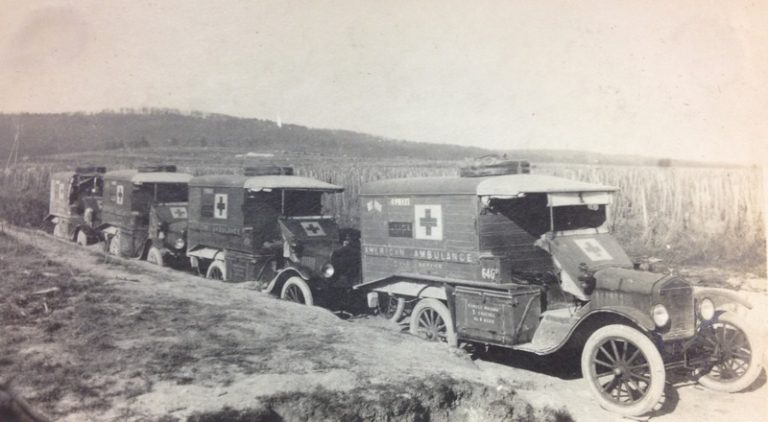

New York, N.Y. Dudley Alleman, my maternal grandfather, was an American ambulance driver with the French Red Cross (Croix-Rouge française) on the battlefields of France during World War I.
Few realize today that the United States entered World War I relatively late in the game, and that many brave Americans had volunteered to serve France against Germany early on. My grandfather, Dudley Alleman, Jr., was one of those men.
“Grandpop” had wanted to help France by serving in its air force, the French Aviation Service, but his eyesight was not strong enough.
Undeterred, he turned to volunteer with the American Red Cross – Croix-Rouge américaine – to staff ambulances on the battlefields. Early in World War I, Americans sympathetic to the Allied cause offered their service to France as ambulance drivers, while others fought in the trenches as members of the French Foreign Legion.
The American Red Cross drivers and the American Field Service (AFS) together founded an exchange program between France and Germany that became the foundation for all modern exchange programs, including, of course, AFS. The choice of Americans to help France fight for liberty and democracy was not surprising given the key role France had played in the American Revolution. There were most certainly those who simply sought adventure, but underlying their engagement were shared political ideals.

Many volunteers came from the cosmopolitan elite and well-educated classes. Some, like the Rockwell brothers, whose grandfathers fought in the American Civil War, came to repay the debt to Lafayette and Count Rochambeau, instrumental in helping the U.S. win independence in the Revolutionary War.
Many joined the French Foreign Legion while others served in the American Ambulance Field Service or as pilots in the Escadrille américaine, later known as the Lafayette Escadrille, acclaimed for their skill and courage.
“When men who have no obligation to fight, who could not possibly be criticized if they did not fight, yet nevertheless decide, upon their own individual initiative, to risk their lives in defense of a cause that they hold to be dear, then we are in the presence of true heroism,” wrote General Gouraud.
For soldiers wounded in the first few weeks of World War I, the first responders were often the ambulance units.

Ambulance drivers drove their wagons and carriages up to the front lines to transport the wounded back to the safety of the nurses and doctors in the triages. But with artillery continually improving in range and accuracy, battlefield triages and hospitals were moved further back behind the front than they had been in previous wars, exacerbating the load faced by already strained horse-carriage ambulances. In response, ambulance services enlisted the help of automobiles.
In addition to the French Red Cross was the American Ambulance Corps, directly affiliated with the American Red Cross, and the American Ambulance Field Service, another volunteer ambulance division, which chose to be integrated directly within the French Army. Both the American Ambulance Corps and the American Field Service chiefly employed college students, graduates, and university faculty in their ambulance divisions, fostering a sense of prestige and genteel tradition around ambulance divisions.
The ambulance drivers faced tremendous danger.
Bombs, wafting noxious gases, and infectious diseases were everyday threats. The chaos and dangers meant that volunteers often were exhausted and experienced trauma akin to that of the soldiers. My grandfather was injured exercising his duties.
The American Field Service Exchange Program I spent a gap year in Germany with in high school grew out of these ambulance drivers who created an exchange program between France and Germany in the hopes that if people knew each other as people, war would be less likely.
Although the vast majority of ambulance drivers came from the nation’s most renowned schools, specifically Harvard and Yale, institutions around the country committed student after student to ambulance duties.
Ambulance drivers tended to understand the war differently from infantry.
It is no secret that many American ambulance drivers became famous writers, actors, and artists after the war, including e.e. Cummings, Ernest Hemingway, and Malcolm Cowley. Many ambulance drivers turned to writing memoirs and novels, and diaries of their experiences were often long, poetic, and descriptive. The nature of their service, their tendency to be educated youths, and their bird’s-eye view of the battlefield may have inspired artistic responses.
The American Field Service no doubt enhanced this phenomenon with the establishment of the American Field Service Fellowship after the war, which sent young Americans and ambulance drivers, like Malcolm Cowley, to France to provide humanitarian aid. Others, like Grandpop, returned home. It seems these volunteers quickly reintegrated into American society after their war service, and many men returned to their former jobs.
Grandpop never spoke to me about his service.
Perhaps I was too young; he died when I was only five. I can only imagine the horrors he witnessed and the fortitude he had to overcome America’s initial neutrality to the death and destruction he witnessed. Reflecting on his bravery, I am reminded of a humorous story: When Grandpop was asked why he chose to drive an ambulance instead of fighting in the trenches, he would jest, “I figured dodging bullets in an ambulance was better than running into them on foot!”
My grandfather’s story is not just a personal family history; it is a chapter in the broader narrative of American volunteerism and international solidarity. His courage and dedication are a legacy that I am proud to carry forward.
#WWIVeterans #AmbulanceDrivers #RedCrossHeroes #FamilyLegacy #Volunteerism #WarHeroes #HistoricalValor #HumanitarianService #AFSExchange #GrandfatherStories
Unsung Heroes: My Grandfather’s Journey with the French Red Cross in WWI (May 24, 2020)